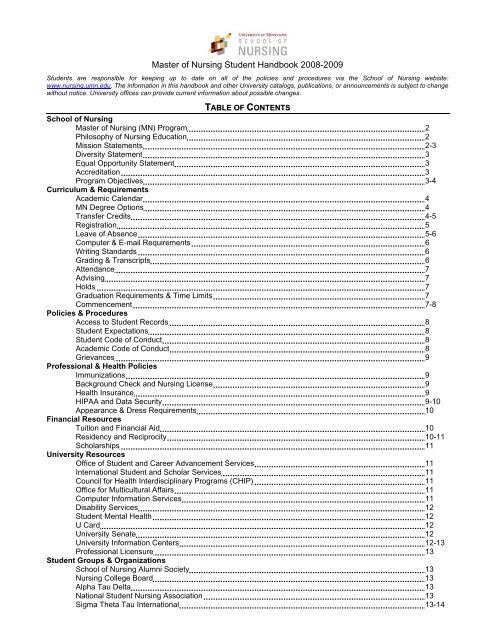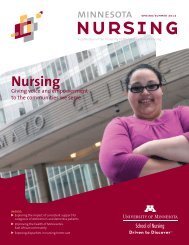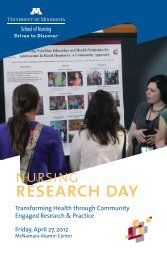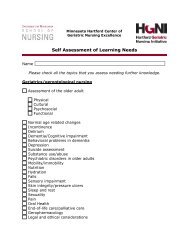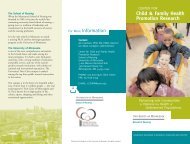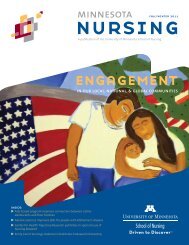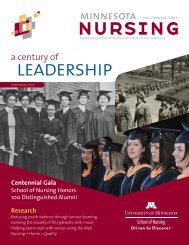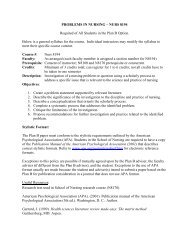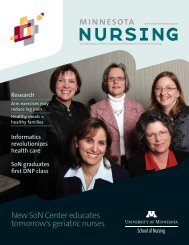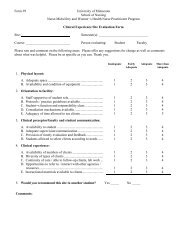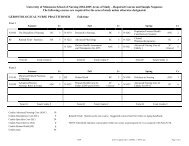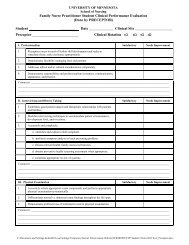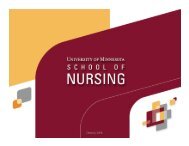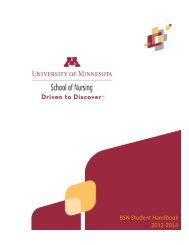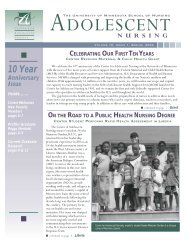Master of Nursing Student Handbook 2008-2009 - School of Nursing ...
Master of Nursing Student Handbook 2008-2009 - School of Nursing ...
Master of Nursing Student Handbook 2008-2009 - School of Nursing ...
Create successful ePaper yourself
Turn your PDF publications into a flip-book with our unique Google optimized e-Paper software.
<strong>Master</strong> <strong>of</strong> <strong>Nursing</strong> <strong>Student</strong> <strong>Handbook</strong> <strong>2008</strong>-<strong>2009</strong><br />
<strong>Student</strong>s are responsible for keeping up to date on all <strong>of</strong> the policies and procedures via the <strong>School</strong> <strong>of</strong> <strong>Nursing</strong> website:<br />
www.nursing.umn.edu. The information in this handbook and other University catalogs, publications, or announcements is subject to change<br />
without notice. University <strong>of</strong>fices can provide current information about possible changes.<br />
TABLE OF CONTENTS<br />
<strong>School</strong> <strong>of</strong> <strong>Nursing</strong><br />
<strong>Master</strong> <strong>of</strong> <strong>Nursing</strong> (MN) Program 2<br />
Philosophy <strong>of</strong> <strong>Nursing</strong> Education 2<br />
Mission Statements 2-3<br />
Diversity Statement 3<br />
Equal Opportunity Statement 3<br />
Accreditation 3<br />
Program Objectives 3-4<br />
Curriculum & Requirements<br />
Academic Calendar 4<br />
MN Degree Options 4<br />
Transfer Credits 4-5<br />
Registration 5<br />
Leave <strong>of</strong> Absence 5-6<br />
Computer & E-mail Requirements 6<br />
Writing Standards 6<br />
Grading & Transcripts 6<br />
Attendance 7<br />
Advising 7<br />
Holds 7<br />
Graduation Requirements & Time Limits 7<br />
Commencement 7-8<br />
Policies & Procedures<br />
Access to <strong>Student</strong> Records 8<br />
<strong>Student</strong> Expectations 8<br />
<strong>Student</strong> Code <strong>of</strong> Conduct 8<br />
Academic Code <strong>of</strong> Conduct 8<br />
Grievances 9<br />
Pr<strong>of</strong>essional & Health Policies<br />
Immunizations 9<br />
Background Check and <strong>Nursing</strong> License 9<br />
Health Insurance 9<br />
HIPAA and Data Security 9-10<br />
Appearance & Dress Requirements 10<br />
Financial Resources<br />
Tuition and Financial Aid 10<br />
Residency and Reciprocity 10-11<br />
Scholarships 11<br />
University Resources<br />
Office <strong>of</strong> <strong>Student</strong> and Career Advancement Services 11<br />
International <strong>Student</strong> and Scholar Services 11<br />
Council for Health Interdisciplinary Programs (CHIP) 11<br />
Office for Multicultural Affairs 11<br />
Computer Information Services 11<br />
Disability Services 12<br />
<strong>Student</strong> Mental Health 12<br />
U Card 12<br />
University Senate 12<br />
University Information Centers 12-13<br />
Pr<strong>of</strong>essional Licensure 13<br />
<strong>Student</strong> Groups & Organizations<br />
<strong>School</strong> <strong>of</strong> <strong>Nursing</strong> Alumni Society 13<br />
<strong>Nursing</strong> College Board 13<br />
Alpha Tau Delta 13<br />
National <strong>Student</strong> <strong>Nursing</strong> Association 13<br />
Sigma Theta Tau International 13-14
THE MASTER OF NURSING (MN) PROGRAM<br />
In 2006, the University <strong>of</strong> Minnesota Board <strong>of</strong> Regents authorized the <strong>School</strong> <strong>of</strong> <strong>Nursing</strong> (SoN) to <strong>of</strong>fer<br />
a <strong>Master</strong> <strong>of</strong> <strong>Nursing</strong> (MN) degree. This program is for people who have a bachelor's degree but are<br />
not yet nurses. The program is an intensive, full-time, 16-month program leading to eligibility to<br />
become licensed as a registered nurse (RN). This program responds to changes in health care,<br />
especially the nursing shortage, by <strong>of</strong>fering a way for people who already have bachelors, masters or<br />
doctoral degrees in other fields to enter nursing as a second career. It provides an excellent<br />
foundation for either the nursing Ph.D. or the Doctor <strong>of</strong> <strong>Nursing</strong> Practice Degree (DNP) at the <strong>School</strong><br />
<strong>of</strong> <strong>Nursing</strong><br />
MN Bridge Program. This is for students who completed the Post Baccalaureate Certificate in nursing<br />
program at the University <strong>of</strong> Minnesota. This 9-credit program involves both coursework and a<br />
clinically-based capstone project. This option will be <strong>of</strong>fered for a limited time.<br />
PHILOSOPHY OF NURSING EDUCATION<br />
<strong>Nursing</strong> is a pr<strong>of</strong>essional discipline involving both an art and a science that exists to identify and<br />
respond to the health concerns <strong>of</strong> society. The evolving body <strong>of</strong> nursing knowledge reflects nursing’s<br />
holistic perspective <strong>of</strong> human beings. This body <strong>of</strong> knowledge includes nursing science, nursing<br />
history, and nursing philosophy and ethics. Multiple methods <strong>of</strong> inquiry are used to gain an<br />
understanding <strong>of</strong> phenomena such as patterns <strong>of</strong> client-environment interaction, the lived experience<br />
<strong>of</strong> health, and the relationship <strong>of</strong> actions to health outcomes.<br />
In providing services to society, nursing practice is based on knowledge from the discipline <strong>of</strong> nursing,<br />
complemented by knowledge from other disciplines. Provision <strong>of</strong> nursing care is more than the<br />
synthesis and application <strong>of</strong> knowledge; it requires ethical determinations, accountability, and the<br />
creative use <strong>of</strong> nursing skills. <strong>Nursing</strong> care involves the personal expression <strong>of</strong> a caring, competent<br />
nurse using self as the primary instrument.<br />
The clients <strong>of</strong> nursing services include individuals, families, groups, and communities who are viewed<br />
holistically within the context <strong>of</strong> their environments. The focus <strong>of</strong> nursing is on the health <strong>of</strong> the client,<br />
whether well or ill. Since diversity in the backgrounds <strong>of</strong> persons influences their perceptions <strong>of</strong><br />
health, the definitions <strong>of</strong> health held by clients, nurses, and society may be in conflict. Therefore, it is<br />
important for nurses to acknowledge their definitions <strong>of</strong> health and to know and respect clients’<br />
definitions and perceptions. Nurses and clients work together to achieve mutually established health<br />
goals related to areas such as functional ability, comfort, self-determination, independence, human<br />
potential, and well-being.<br />
<strong>Nursing</strong> care is provided in a variety <strong>of</strong> settings in collaboration with other pr<strong>of</strong>essionals. Multilevel,<br />
interdependent nursing roles are needed for providing care; each role requires distinct educational<br />
preparation. All nursing students experience learning as a dynamic, interactive process in which<br />
faculty and student alike participate. <strong>Student</strong>s work with clinical nursing experts, participate in nursing<br />
research, and develop skills essential to excellence in practice, scholarship and leadership in a variety<br />
<strong>of</strong> settings. <strong>Student</strong>s are engaged and actively involved in the processes <strong>of</strong> learning; curriculum and<br />
faculty facilitate the development <strong>of</strong> graduates as life-long learners.<br />
SCHOOL OF NURSING MISSION STATEMENT<br />
The mission <strong>of</strong> the SoN is to generate and disseminate knowledge necessary for promoting health by<br />
developing and improving the nursing care <strong>of</strong> individuals, families, communities and populations that<br />
<strong>Master</strong> <strong>of</strong> <strong>Nursing</strong> <strong>Handbook</strong> <strong>2008</strong>-09, page 2
eflect diversity in society. This mission contributes to the achievement <strong>of</strong> the three-part mission <strong>of</strong> the<br />
University <strong>of</strong> Minnesota.<br />
• The research mission <strong>of</strong> the school is the continuing development <strong>of</strong> the discipline and<br />
pr<strong>of</strong>ession <strong>of</strong> nursing through basic and applied nursing inquiry and through research-based<br />
practice.<br />
• The education mission <strong>of</strong> the school is to prepare persons who are skilled in the delivery <strong>of</strong><br />
nursing care and the development <strong>of</strong> nursing knowledge to improve client outcomes and who<br />
will provide leadership in nursing research, education and practice.<br />
• The service mission <strong>of</strong> the school is to share the nursing expertise <strong>of</strong> the members <strong>of</strong> the<br />
<strong>School</strong> <strong>of</strong> <strong>Nursing</strong> with the wider community.<br />
UNIVERSITY OF MINNESOTA MISSION STATEMENT<br />
In all <strong>of</strong> its activities, the University strives to sustain an open exchange <strong>of</strong> ideas in an environment<br />
that embodies the values <strong>of</strong> academic freedom, responsibility, integrity, and cooperation; that provides<br />
an atmosphere <strong>of</strong> mutual respect, free from racism, sexism, and other forms <strong>of</strong> prejudice and<br />
intolerance; that assists individuals, institutions, and communities in responding to a continuously<br />
changing work; that is conscious <strong>of</strong> and responsive to the needs <strong>of</strong> the many communities it is<br />
committed to serving; that creates and supports partnerships within the university, with other<br />
educational systems, and with communities to achieve common goals; and that inspires, sets high<br />
expectations for, and empowers the individuals within its community.<br />
DIVERSITY STATEMENT<br />
The growing diversity <strong>of</strong> the nation's population underscores the need to prepare future nursing<br />
practitioners and researchers who are knowledgeable and sensitive to the population's needs. The<br />
SoN seeks to admit and educate a diverse student body, both in order to enrich the students'<br />
educational experience and to prepare them to meet the health needs <strong>of</strong> a diverse society.<br />
<strong>Student</strong> body characteristics that will enhance diversity in the school include leadership qualities, a<br />
strong work, community or public service record, special talents and interests, gender (males are<br />
underrepresented in the nursing pr<strong>of</strong>ession), and a wide range <strong>of</strong> economic, social, racial/ethnic and<br />
geographic backgrounds.<br />
EQUAL OPPORTUNITY<br />
The University <strong>of</strong> Minnesota is committed to the policy that all persons shall have equal access to its<br />
programs, facilities, and employment without regard to race, color, creed, religion, national origin, sex,<br />
age, marital status, disability, public assistance status, veteran status, or sexual orientation.<br />
Inquiries regarding compliance may be directed to the Director, Office <strong>of</strong> Equal Opportunity and<br />
Affirmative Action, University <strong>of</strong> Minnesota, 419 Morrill Hall, 100 Church Street S.E., Minneapolis, MN<br />
55455, (612) 624-9547, eoaa@umn.edu, www.eoaffact.umn.edu.<br />
COMMISSION ON COLLEGIATE NURSING EDUCATION (CCNE) ACCREDITATION<br />
Officially recognized by the U.S. Secretary <strong>of</strong> Education as a national accreditation agency, the CCNE<br />
is an autonomous accrediting agency contributing to the improvement <strong>of</strong> the public's health. CCNE<br />
ensures the quality and integrity <strong>of</strong> baccalaureate and graduate education programs preparing<br />
effective nurses. Visit their website for more information: http://www.aacn.nche.edu/Accreditation/.<br />
The <strong>School</strong> <strong>of</strong> <strong>Nursing</strong> programs are accredited by CCNE. Reaccreditation is scheduled for 2010. The<br />
<strong>Master</strong> <strong>of</strong> <strong>Nursing</strong> program is also fully recognized by the Minnesota Board <strong>of</strong> <strong>Nursing</strong>. Graduates <strong>of</strong><br />
the program are eligible to take the Registered <strong>Nursing</strong> licensure examination (N-CLEX).<br />
MASTER OF NURSING PROGRAM OBJECTIVES<br />
The <strong>Master</strong> <strong>of</strong> <strong>Nursing</strong> Program is for high-ability, achievement-oriented students who have an earned<br />
baccalaureate degree in a field other than nursing. The program provides a challenging learning<br />
environment with innovative approaches to faculty-student relationships and scholarly learning<br />
<strong>Master</strong> <strong>of</strong> <strong>Nursing</strong> <strong>Handbook</strong> <strong>2008</strong>-09, page 3
experiences. <strong>Nursing</strong> courses include lectures, seminars, laboratories, and clinical practice. <strong>Student</strong>s<br />
learn patient/client care in hospitals, clinics, homes, long-term care facilities, and other healthcare<br />
settings. <strong>Student</strong>s provide care to clients with diverse health care problems in real life situations.<br />
The MN Program prepares graduates who are ready for entry into nursing practice and for continuing<br />
to work toward advanced practice specialization. They are prepared to provide nursing care in a<br />
variety <strong>of</strong> settings, to use a scholarly approach in acquiring knowledge, to be life-long learners, and to<br />
be leaders in nursing. Graduates identify with nursing as a pr<strong>of</strong>ession, and are able to articulate the<br />
nurse's role to other disciplines in healthcare and to the public.<br />
At the completion <strong>of</strong> the program, the students will:<br />
• View individuals, families, communities and populations as unique and as interacting with an<br />
ever-changing environment.<br />
• Describe a focus <strong>of</strong> nursing as caring in the human health experience.<br />
• Demonstrate competence in the delivery <strong>of</strong> nursing care that reflects sensitivity to diversity.<br />
• Understand the contributions <strong>of</strong> philosophic, empiric and aesthetic knowledge to the<br />
development <strong>of</strong> the discipline <strong>of</strong> nursing.<br />
• Develop and evaluate positions on moral and ethical issues in health care.<br />
• Understand multiple methods <strong>of</strong> research.<br />
• Appreciate the obligation for lifelong learning in pr<strong>of</strong>essional nursing practice.<br />
• Use critical thinking skills to evaluate knowledge for its relevance to practice and for its<br />
potential for contributing to the discipline.<br />
• Foster innovation and manage change in the delivery <strong>of</strong> care to improve outcomes.<br />
CURRICULUM & REQUIREMENTS<br />
ACADEMIC CALENDAR<br />
The SoN follows the University <strong>of</strong> Minnesota’s academic calendar for spring and fall semesters. Summer<br />
courses are on the extended summer term schedule (check with program director or course faculty for<br />
schedules). The fall and spring calendar is online at http://onestop.umn.edu/onestop/calendar.html.<br />
MN DEGREE OPTIONS<br />
MN Program<br />
Fifty-four credits are required for the <strong>Master</strong> <strong>of</strong> <strong>Nursing</strong> program:<br />
Fall I<br />
Nurs 8170: Research in <strong>Nursing</strong> (3 cr.)<br />
Nurs 5030: Clinical Foundations/Skills Lab (7 cr.)<br />
Nurs 5222 Advanced Physiology (3 cr.)<br />
Phar 5800: Pharmacotherapy for the Health Pr<strong>of</strong>essions (3 cr.)<br />
Summer I<br />
Nurs 8100: Discipline <strong>of</strong> <strong>Nursing</strong>/Theory (3 cr.)<br />
Nurs 5033: Population Response to Health & Mental Illness (5 cr.)<br />
Nurs 5115 may be taken here if it is <strong>of</strong>fered (3 cr.)<br />
Spring I<br />
Nurs 5200: Holistic Assessment (3 cr.)<br />
Nurs 5031: Adults & Elders (6 cr.)<br />
Nurs 5032: Children & Childbearing Families (6 cr.)<br />
Fall II<br />
Nurs 8140: Moral & Ethical Positions in <strong>Nursing</strong> (3 cr.)<br />
Nurs 5241: Healthcare Leadership (3 cr.)<br />
Nurs 5115: Informatics (or summer if <strong>of</strong>fered) (3 cr.)<br />
Nurs 5034: Clinical Seminar: <strong>Nursing</strong> Care <strong>of</strong> Clients with<br />
Complex Health Conditions (2 cr.)<br />
Nurs 5035: Practicum: <strong>Nursing</strong> Care <strong>of</strong> Clients with<br />
Complex Health Conditions (4 cr.)<br />
MN Bridge Program<br />
The MN bridge provides coursework for students with U <strong>of</strong> M Graduate <strong>School</strong> Post Baccalaureate<br />
Certificate in <strong>Nursing</strong> in order to progress through to the MN degree. Three courses (9 credits) are<br />
required: <strong>Nursing</strong> Informatics (NURS 5115), Advanced Physiology (NURS 5222) and a capstone<br />
project (NURS 5830).<br />
TRANSFER CREDITS<br />
If you wish to use a course from another institution to meet program requirements, you must file a<br />
petition through your advisor, who will submit it to the <strong>School</strong> <strong>of</strong> <strong>Nursing</strong> Graduate Admissions and<br />
<strong>Master</strong> <strong>of</strong> <strong>Nursing</strong> <strong>Handbook</strong> <strong>2008</strong>-09, page 4
Progressions committee. No more than 40% <strong>of</strong> the coursework on your <strong>of</strong>ficial program <strong>of</strong> study may<br />
be transfer courses (this equates to 21 credits for the MN program). Course work will be accepted if<br />
content is in compliance with MN Board <strong>of</strong> <strong>Nursing</strong> rules and meets requirements <strong>of</strong> the MN program.<br />
At least 60% <strong>of</strong> the coursework must be taken as a registered University <strong>of</strong> Minnesota student in<br />
nursing. Courses are considered transfer courses if they are taken at another institution, taken for<br />
another graduate degree in a program at the University <strong>of</strong> Minnesota that is not part <strong>of</strong> the SoN (e.g.,<br />
<strong>School</strong> <strong>of</strong> Public Health), coursework taken before being admitted to the MN program and listed on<br />
your transcript as non-degree, or program courses petitioned and approved based on equivalent<br />
work/life experience.<br />
REGISTRATION<br />
To maintain active student status, MN students must register every fall, spring, and summer term.<br />
Those who do not register in the <strong>School</strong> <strong>of</strong> <strong>Nursing</strong> every fall, spring, and summer are considered to<br />
have withdrawn and their SoN records are deactivated. Deactivated students may not register for<br />
courses, take examinations, submit a Degree Plan form, file for graduation, or otherwise participate in<br />
the University community as <strong>School</strong> <strong>of</strong> <strong>Nursing</strong> MN students. Those who wish to resume coursework<br />
must request readmission to the SoN and, if readmitted, must register in the <strong>School</strong> for the term <strong>of</strong><br />
readmission to regain their active status.<br />
A zero-credit, zero-fee, non-graded registration option is available for those students who, because <strong>of</strong><br />
extraordinary circumstances, are not able to take courses in a given semester, but must register<br />
solely to meet the continuous registration requirement. NURS 777 does not meet any other<br />
internal/external departmental or agency requirements. You must meet with your advisor to receive<br />
permission to register for NURS 777. Note that late registration fees will be assessed if you register<br />
past the deadline date.<br />
<strong>Student</strong>s receiving financial aid from the University or other agencies, international students with<br />
certain types <strong>of</strong> visas, and students who wish to use various University services and facilities may<br />
have specific registration requirements; these students are responsible for obtaining information about<br />
such requirements from the appropriate <strong>of</strong>fices.<br />
REGISTRATION INSTRUCTIONS<br />
The University <strong>of</strong> Minnesota uses an online registration system through One Stop:<br />
www.onestop.umn.edu. To register for courses, you will need to login using your University assigned<br />
Internet ID and password. There is a tutorial on the registration site to help you get started.<br />
After you have registered, you may go back into the registration system and make changes – add<br />
courses, cancel courses, and change grade-bases (A-F or S-N).<br />
Course Permission Numbers. If prerequisites for a course indicate that instructor consent is required<br />
for course entry, or if a course is closed, or if you are trying to register in the second week <strong>of</strong> the term,<br />
you will be required to enter a permission number in order to register. A permission number<br />
represents the instructor’s consent for entry into a course. You must, therefore, contact the instructor<br />
<strong>of</strong> the course to get a permission number. Requests for permission numbers should be done via e-<br />
mail. Faculty e-mails are linked to the courses within the One Stop registration system.<br />
Cancellations, Withdrawals and Refunds. File for an <strong>of</strong>ficial cancellation by computer or at a<br />
registration center as soon as you decide to withdraw from a course or courses. Tuition and course<br />
fees are refunded on a prorated schedule. For more information, go to www.onestop.umn.edu or<br />
contact the Office <strong>of</strong> the Registrar in 200 Fraser Hall, 612-624-1111.<br />
You are responsible for your registration; carefully check the courses you have registered for and<br />
apprise yourself <strong>of</strong> the deadlines for cancellations, grade-base changes, and refunds.<br />
LEAVE OF ABSENCE<br />
If you know that you will be absent for more than one semester, you must apply for a Leave <strong>of</strong><br />
Absence in order to maintain your enrollment status in the SoN. Please submit your request for a<br />
<strong>Master</strong> <strong>of</strong> <strong>Nursing</strong> <strong>Handbook</strong> <strong>2008</strong>-09, page 5
Leave <strong>of</strong> Absence (form located at www.nursing.umn.edu) to your advisor. Your request will then be<br />
submitted to the SoN Graduate Admissions and Progressions Committee for review. Due to the<br />
nature <strong>of</strong> pre-licensure programs, students may be required to repeat clinical course work that is more<br />
than 1 year old.<br />
COMPUTER AND E-MAIL REQUIREMENTS<br />
Computer competency is defined as a basic familiarity with computers, use <strong>of</strong> the internet and e-mail,<br />
and word processing. The SoN requires that all students have e-mail and internet access for<br />
communication and coursework.<br />
All students registered at the University <strong>of</strong> Minnesota are assigned an e-mail account. <strong>Student</strong>s in the<br />
SoN are expected to have computer competency and to access their University <strong>of</strong> Minnesota e-mail<br />
account on a regular basis. E-mail is the <strong>of</strong>ficial mode <strong>of</strong> communication used by the University <strong>of</strong><br />
Minnesota and the <strong>School</strong> <strong>of</strong> <strong>Nursing</strong>. Faculty and staff regularly send announcements, notifications,<br />
and other correspondence to nursing students through e-mail. It is your responsibility to manage your<br />
University e-mail account to ensure you receive <strong>of</strong>ficial University announcements. Do not forward the<br />
account to another server (e.g., Hotmail or Yahoo).<br />
Before you can use your e-mail account or use the online registration system, you must initiate your<br />
account. To initiate it, go to www.onestop.umn.edu/initiate. You will be asked to submit your Social<br />
Security Number, your <strong>Student</strong> ID Number, and your date <strong>of</strong> birth. Then you will set a password that<br />
you may use for accessing your e-mail and other security controlled sites at the University. For any<br />
secure site, the computer will require your Internet ID – also known as you x.500 – (everything up to<br />
the @ sign in your U <strong>of</strong> M e-mail address, e.g., smit0000) and your password. If you are unable to<br />
initiate your account, contact the helpline at 612-301-HELP.<br />
WRITING STANDARDS<br />
The SoN has adopted the writing standards from the American Psychological Association (APA). All<br />
written assignments must conform to the stylistic requirements outlined by the APA. <strong>Student</strong>s in the<br />
<strong>School</strong> <strong>of</strong> <strong>Nursing</strong> are required to have a copy <strong>of</strong> the Publication Manual <strong>of</strong> the American<br />
Psychological Association, 5th Edition (2001), which describes correct stylistic formats. Refer to<br />
www.apastyle.org for more information.<br />
GRADING AND TRANSCRIPTS<br />
The SoN uses two grading systems: A-B-C-D-F (with pluses and minuses) and S-N (S stands for<br />
satisfactory and N stands for no credit). <strong>School</strong> policy dictates that at least two-thirds <strong>of</strong> the course<br />
credits on a student's <strong>of</strong>ficial Degree Plan must be taken under the A-F system. All clinical courses<br />
must be taken under the A-F system. In some instances, courses are <strong>of</strong>fered only using one grading<br />
system. Note: Only courses for which you receive A, B, C, and S grades may fulfill degree<br />
requirements, and S-N grades are not calculated in your Grade Point Average (GPA). <strong>Student</strong>s who<br />
do not maintain a minimum 3.0 GPA will be placed on academic probation. The SoN requires a<br />
minimum overall GPA <strong>of</strong> 3.00 (on a 4.00 scale) for courses included on the MN Degree Plan. Grading<br />
option changes are not permitted after the second week <strong>of</strong> the term (earlier for the summer term).<br />
Under provisions <strong>of</strong> federal and state legislation, examination scores, course grades, and similar<br />
indicators <strong>of</strong> student academic progress are not public information. Accordingly, such information<br />
cannot be released or made public without written student permission, except for normal educational<br />
and administrative uses within the University.<br />
The Office <strong>of</strong> the Registrar in Fraser Hall maintains and releases student transcripts, the <strong>of</strong>ficial<br />
University record <strong>of</strong> grades and registration symbols for all courses students take. You can request an<br />
<strong>of</strong>ficial transcript online at www.onestop.umn.edu. With a picture ID you may pick up an un<strong>of</strong>ficial<br />
transcript in person, free <strong>of</strong> charge, at the <strong>Student</strong> Service Center (200 Fraser Hall).<br />
To view your recent grades or find out your GPA or total credits visit www.onestop.umn.edu.<br />
<strong>Master</strong> <strong>of</strong> <strong>Nursing</strong> <strong>Handbook</strong> <strong>2008</strong>-09, page 6
ATTENDANCE<br />
<strong>School</strong> <strong>of</strong> <strong>Nursing</strong> instructors determine and inform students <strong>of</strong> their own policies and procedures<br />
regarding absence from class and examinations. Make-up work is determined at the sole discretion <strong>of</strong><br />
the instructors, and they are not obligated to afford or arrange make-up times due to student absence<br />
unless it is due to one <strong>of</strong> the following circumstances: participation in a formally approved and<br />
scheduled University activity, performance <strong>of</strong> military or civil duty (such as jury duty) that cannot be<br />
deferred, illness or family emergency.<br />
<strong>Student</strong>s are expected to attend all meetings <strong>of</strong> their courses. They may be excused from class,<br />
however, to participate in religious observances and for approved University activities. Instructors<br />
must be notified at the beginning <strong>of</strong> the term about such planned absences and arrangements made<br />
to make-up required work. Instructors are not required to accommodate makeup <strong>of</strong> laboratory<br />
experiences or examinations to suit students’ personal convenience or to accommodate<br />
situations such as vacations.<br />
ADVISING<br />
The Director <strong>of</strong> the <strong>Master</strong> <strong>of</strong> <strong>Nursing</strong> program serves as the academic advisor for MN students.<br />
Contact the director at rowan005@umn.edu to discuss course selection, registration issues, and longterm<br />
planning.<br />
HOLDS<br />
If you have a hold on your record, you may not register or obtain transcripts until the hold is cleared<br />
with the <strong>of</strong>fice imposing it. Holds may be imposed for unpaid tuition or fees (e.g., library fines),<br />
immunization or HIPAA requirements not completed, or for disciplinary or scholastic reasons. For<br />
example, the <strong>School</strong> <strong>of</strong> <strong>Nursing</strong> will place holds for a low GPA or for too many incompletes. Holds are<br />
most <strong>of</strong>ten placed for failure to provide evidence <strong>of</strong> up-to-date immunizations, criminal background<br />
check, or CPR certification.<br />
You can view any holds on your record via the One Stop website: www.onestop.umn.edu.<br />
GRADUATION REQUIREMENTS AND TIME LIMITS<br />
Degrees are awarded on the last day <strong>of</strong> the month in which the student graduates. <strong>Master</strong> <strong>of</strong> <strong>Nursing</strong><br />
students graduate in December. To qualify for graduation, you must submit the Application for Degree<br />
form on or before the first workday <strong>of</strong> that month and must complete all program requirements<br />
(including submission <strong>of</strong> all necessary forms) by the last workday <strong>of</strong> that month. The degree is<br />
formally posted on the transcript two to three weeks after the last day <strong>of</strong> the month <strong>of</strong> graduation.<br />
As an MN student, you must meet the following guidelines:<br />
• Remain an "active" graduate student--meaning you have registered in the semester you plan<br />
to graduate;<br />
• Apply for graduation on or before the first day <strong>of</strong> the month you wish to graduate; and<br />
• Complete and have all grades posted for courses by the last day <strong>of</strong> the month you wish to<br />
graduate (any Incomplete grades must be changed to a grade).<br />
All requirements for the MN degree must be completed and the degree awarded within 2 years <strong>of</strong><br />
enrollment. The earliest coursework listed on the <strong>of</strong>ficial MN Degree Plan form, including transfer<br />
credit, may not be older than five years at the time <strong>of</strong> graduation.<br />
COMMENCEMENT<br />
Generally, commencement will be hosted once per year in December. To participate in the<br />
commencement ceremony, you must be close to completing all requirements for graduation. Your<br />
advisor will help you decide if it is appropriate for you to participate in commencement.<br />
To make sure your name appears in the printed commencement program, you must complete a<br />
Commencement Attendance Request form, have it signed by your advisor, and submit it to the <strong>School</strong><br />
<strong>of</strong> <strong>Nursing</strong> Office <strong>of</strong> <strong>Student</strong> and Career Advancement Services by the deadline listed on the form.<br />
<strong>Master</strong> <strong>of</strong> <strong>Nursing</strong> <strong>Handbook</strong> <strong>2008</strong>-09, page 7
The Commencement Attendance Approval form and commencement instructions are online at<br />
www.nursing.umn.edu in the “current students” section.<br />
POLICIES & PROCEDURES<br />
ACCESS TO STUDENT RECORDS<br />
The University <strong>of</strong> Minnesota has established policies regarding privacy and access to student<br />
educational records. The SoN adheres to these policies, which can be found at<br />
www.umn.edu/regents/policies/administrative/<strong>Student</strong>_Education_Records.pdf. You may review your<br />
file in the Office <strong>of</strong> <strong>Student</strong> and Career Advancement Services (5-160 WDH) by appointment. You<br />
may review the information contained in the file but you may not copy or remove it. Requests made to<br />
the Office <strong>of</strong> <strong>Student</strong> and Career Advancement Services to send copies <strong>of</strong> previously submitted<br />
documents such as transcripts or references to other agencies or universities are usually not granted.<br />
<strong>Student</strong>s are expected to maintain their own records and to contact the primary document source for<br />
additional records should the need arise.<br />
EXPECTATIONS OF STUDENT IN RESEARCH, SCHOLARSHIP, AND PROFESSIONAL EDUCATION<br />
The University has adopted a comprehensive educational program to provide members <strong>of</strong> the<br />
University community with the knowledge and resources they will need to act as responsible<br />
researchers and scholars. As part <strong>of</strong> the educational initiative, each graduate program is required to<br />
provide its students—through courses, informal seminars and individual mentoring—opportunities to<br />
learn about ethical issues from a disciplinary perspective and to explore these openly. If you have<br />
questions regarding the nature or fulfillment <strong>of</strong> the requirement, please consult with your advisor.<br />
Note: students who plan to conduct research with human subjects are required to submit a Human<br />
Subjects form to the Institutional Review Board that reviews research projects involving human<br />
subjects to ensure that two broad standards are upheld: first, that subjects are not placed at undue<br />
risk; second, that they give uncoerced, informed consent to their participation.<br />
STUDENT CODE OF CONDUCT<br />
The SoN follows the <strong>Student</strong> Code <strong>of</strong> Conduct put forth by the Board <strong>of</strong> Regents at the University <strong>of</strong><br />
Minnesota. The code is available on the Board <strong>of</strong> Regents website<br />
http://www1.umn.edu/regents/policies/academic/<strong>Student</strong>_Conduct_Code.pdf, or through the Office for<br />
<strong>Student</strong> Conduct and Academic Integrity at http://www1.umn.edu/oscai/.<br />
The Office for <strong>Student</strong> Conduct and Academic Integrity (OSCAI) endeavors to promote scholastic<br />
responsibility and skill on the part <strong>of</strong> individual students; to aid faculty and instructional staff in<br />
providing a positive learning environment through the prevention and detection <strong>of</strong> cheating; and to<br />
serve as a centralized forum for the fair and even-handed resolution <strong>of</strong> reported cases <strong>of</strong> student<br />
scholastic dishonesty. Consultations, workshops and other resources are made available through<br />
OSCAI to students as well as faculty to foster academic integrity and to help define, recognize, and<br />
deter instances <strong>of</strong> scholastic dishonesty.<br />
The <strong>Student</strong> Conflict Resolution Center (SCRC) provides a full range <strong>of</strong> services to students with<br />
campus-based complaints or concerns. An ombudsman helps students resolve problems informally.<br />
An advocate is also available to assist students in formal grievance or disciplinary hearings. SCRC<br />
can help students deal with university regulations and policies, or misunderstandings between<br />
students and instructors or administrators. <strong>Student</strong>s may also have concerns about unfair treatment or<br />
may have been accused <strong>of</strong> a violation <strong>of</strong> the <strong>Student</strong> Conduct Code. Visit the SCRC web site at<br />
www.sos.umn.edu.<br />
ACADEMIC CODE OF CONDUCT<br />
The <strong>School</strong> <strong>of</strong> <strong>Nursing</strong> follows the academic code <strong>of</strong> conduct put forth by the Board <strong>of</strong> Regents at the<br />
University <strong>of</strong> Minnesota. The code is available on the Board <strong>of</strong> Regents website:<br />
http://www1.umn.edu/regents/policies/academic/Conduct.pdf.<br />
<strong>Master</strong> <strong>of</strong> <strong>Nursing</strong> <strong>Handbook</strong> <strong>2008</strong>-09, page 8
STUDENT ACADEMIC GRIEVANCE POLICY<br />
This policy addresses academic grievances only. It is the goal <strong>of</strong> the policy to provide a simple and<br />
expeditious process, allowing for both informal and formal resolutions <strong>of</strong> conflicts:<br />
www.umn.edu/usenate/policies/stugrieve.html for complete document.<br />
PROFESSIONAL & HEALTH POLICIES<br />
IMMUNIZATIONS<br />
All students in the University <strong>of</strong> Minnesota Academic Health Center (AHC) schools and programs are<br />
required to have immunizations and/or tests as a condition <strong>of</strong> enrollment. All immunization<br />
requirements must be completed prior to matriculation. See the Boynton Health Service web site for<br />
more information: http://www.bhs.umn.edu/services/AHC.htm#AHC.<br />
CRIMINAL BACKGROUND CHECK & NURSING LICENSE<br />
Minnesota state law requires a background check on any person who directly works with patients or<br />
residents in health care facilities. The state allows educational programs to initiate the background<br />
studies on their students as an alternative to each licensed facility requesting the studies. Results <strong>of</strong><br />
background checks initiated by an educational program may be released to the clinical sites where<br />
our students are placed. <strong>Student</strong>s sign a Release <strong>of</strong> Information form that allows the <strong>School</strong> <strong>of</strong><br />
<strong>Nursing</strong> to share results with other facilities. The release form and the results <strong>of</strong> the background study<br />
are valid for one year only; therefore, you must update both forms each year.<br />
If the results <strong>of</strong> the background check disqualify you from having direct patient contact and if the<br />
disqualification is not set aside by the Commissioner <strong>of</strong> Health, you may not be accepted for clinical<br />
placement at licensed facilities. Consequently, you might not be eligible for a degree in our program. If<br />
you are disqualified but have requested reconsideration from the Commissioner <strong>of</strong> Health, in most<br />
circumstances clinical sites may allow you to continue direct patient contact at their facility, pending<br />
the outcome <strong>of</strong> the reconsideration. You must, however, provide documentation that you have<br />
requested the reconsideration.<br />
HEALTH INSURANCE<br />
All Academic Health Center students will be automatically enrolled and charged for the University<br />
Sponsored Health Benefit Plan (SHBP). This plan is approximately $1000+ per semester. <strong>Student</strong>s<br />
can have the plan waived if they are enrolled in an employer-based insurance plan, the University<br />
Sponsored Graduate Assistant Plan, or Minnesota Care. To waive the plan, you must provide pro<strong>of</strong> <strong>of</strong><br />
insurance in the form <strong>of</strong> a Certificate <strong>of</strong> Credible Coverage to the <strong>Student</strong> Insurance <strong>of</strong>fice at Boynton<br />
Health Service: www.bhs.umn.edu.<br />
HIPAA AND DATA SECURITY<br />
HIPAA stands for the Health Insurance Portability and Accountability Act <strong>of</strong> 1996 and requires us to<br />
implement processes with respect to protected health information as well as inform individuals about<br />
how we protect their information. As a nursing student, you must comply with HIPAA and data security<br />
measures outlined by the University <strong>of</strong> Minnesota.<br />
The University's HIPAA Privacy Training consists <strong>of</strong> a total <strong>of</strong> three courses located in you MyU portal:<br />
1. Introduction to HIPAA Privacy and Security Video (video format)<br />
2. Privacy and Confidentiality in Research (interactive module)<br />
3. Privacy and Confidentiality in the Clinical Setting (interactive module<br />
Partnering with the Office <strong>of</strong> Information Technology, the University Privacy & Security Office<br />
produced the Public Jobs: Private Data University Security Training Program. The program covers<br />
security measures required for handling private data protected under federal and state laws as well as<br />
University policies. You will learn to identify security issues, how to protect data and hardware, and<br />
the protocol for responding to a security problem.<br />
<strong>Master</strong> <strong>of</strong> <strong>Nursing</strong> <strong>Handbook</strong> <strong>2008</strong>-09, page 9
All University faculty, staff, student workers, and health science students and volunteers are required<br />
to take the training. An e-mail message will alert individuals when to go to your MyU portal and log in<br />
using your U <strong>of</strong> M Internet (X.500) IDs and passwords.<br />
Each training module is assigned to your portal on a staggered schedule, with two weeks between<br />
each course. The content includes not only HIPAA but the Federal Education Rights and Privacy Act<br />
(FERPA), Gramm-Leach Bliley Act (GLBA), the Minnesota Data Practices Act, and University policies.<br />
Step by step instructions on how to complete both <strong>of</strong> these requirements are located at<br />
http://www.ahc.umn.edu/privacy/privtraining/stepbystep/home.html.<br />
If you experience any technical problems, please contact the University Computer Help Line at 612-<br />
301-4357 (or 1-HELP if dialing from on campus).<br />
APPEARANCE & DRESS<br />
All <strong>Master</strong> <strong>of</strong> <strong>Nursing</strong> students are required to wear burgundy scrubs with the approved <strong>of</strong>ficial logo <strong>of</strong><br />
the <strong>School</strong> <strong>of</strong> <strong>Nursing</strong> embroidered in gold on the top while in clinical sites unless otherwise directed<br />
by faculty (e.g. public health). You are also required to wear a white lab coat with the <strong>of</strong>ficial logo<br />
embroidered in burgundy.<br />
The scrubs and lab coat must be purchased from Signature Concepts through the following website:<br />
http://www.signatureconcepts.com/u<strong>of</strong>mnursing/.<br />
As part <strong>of</strong> your nursing education, you will be completing clinical rotations in local hospitals and other<br />
health care settings. While you are at these locations, you are required to dress appropriately as an<br />
ambassador <strong>of</strong> our University. Jeans or sandals are not appropriate. If you are in an in-patient setting,<br />
you will most likely be required to wear scrubs, in a community clinic setting, business casual dress is<br />
appropriate. You must wear your University <strong>of</strong> Minnesota issued clinical ID badge at all times at the<br />
clinical sites. The clinical ID badge is obtained from the U Card Office located in C<strong>of</strong>fman Memorial<br />
Union, room G22 (612-626-9900).<br />
FINANCIAL RESOURCES<br />
TUITION & FINANCIAL AID<br />
Tuition and fee information is located on the One Stop web site at<br />
http://onestop.umn.edu/onestop/Tuition_Billing/Tuition_Rates/Pr<strong>of</strong>essional_<strong>School</strong>_Tuition_Rates.html. Rates<br />
are set in July for the next academic year.<br />
The Office <strong>of</strong> <strong>Student</strong> Finance (OSF) administers scholarships, grants, work-study, and loans.<br />
Financial aid application packets are available beginning January 1. Check with OSF for application<br />
deadlines. You may also apply on the Web, either: 1) on-campus at one <strong>of</strong> the 20 self-serve<br />
computers available in 200 Fraser or 2) wherever you have Internet access at www.fafsa.ed.gov.<br />
Full financial aid services are available at 200 Fraser Hall (<strong>Student</strong> Services Center) on the<br />
Minneapolis campus. Financial aid counselors are available during <strong>of</strong>fice hours Monday through<br />
Friday on a walk-in basis and by appointment.<br />
Walk-in financial aid counseling is also available for Academic Health students three days a week (M,<br />
W, Th noon-4 p.m.) at 2-693 Moos Tower. The financial aid counselor, Rockne Bergman, can be<br />
reached by phone at 612-624-4138.<br />
RESIDENCY AND RECIPROCITY<br />
Because the University is a state institution, residents <strong>of</strong> Minnesota pay lower tuition than<br />
nonresidents. The University’s definition <strong>of</strong> the term “resident” may be different from the definitions<br />
developed by other, non-University agencies. The University does not recognize declarations <strong>of</strong><br />
resident status made by other agencies. Thus a person who is a Minnesota resident for tax or voting<br />
<strong>Master</strong> <strong>of</strong> <strong>Nursing</strong> <strong>Handbook</strong> <strong>2008</strong>-09, page 10
purposes, for example, is not necessarily a resident for University <strong>of</strong> Minnesota tuition and admission<br />
purposes.<br />
For definitions <strong>of</strong> residency and for more information about policies, or to apply for residency, please<br />
visit http://admissions.tc.umn.edu/PDFs/ResidencyReciprocity00.pdf.<br />
The University has reciprocity agreements with North Dakota, South Dakota, Wisconsin, and<br />
Manitoba. If you are a resident <strong>of</strong> any <strong>of</strong> the above, you may qualify for reciprocity tuition rates. For<br />
more information, call 612-625-6330 or go to 240 Williamson Hall or visit www.onestop.umn.edu.<br />
SCHOLARSHIPS<br />
The SoN Foundation awards scholarships in June for the following year. All active, full-time, MN<br />
students are eligible to apply. Applications are accepted and reviewed only once per year, in spring<br />
semester. <strong>Student</strong>s are informed by e-mail when applications are available. The scholarships are<br />
awarded by various criteria, e.g., GPA, areas <strong>of</strong> interest, or need. For more information contact the<br />
Office <strong>of</strong> <strong>Student</strong> and Career Advancement Services (612-625-7980 or sonstudentinfo@umn.edu).<br />
Because the MN program is an intense, 16-month course <strong>of</strong> study, we strongly discourage our<br />
students from working while in the program, especially during spring and summer terms.<br />
RESOURCES<br />
OFFICE OF STUDENT AND CAREER ADVANCEMENT SERVICES, SCHOOL OF NURSING<br />
The Office <strong>of</strong> <strong>Student</strong> and Career Advancement Services (OSCAS) is your central resource for<br />
information in the <strong>School</strong> <strong>of</strong> <strong>Nursing</strong>. It is located in 5-160 Weaver-Densford Hall, and the <strong>of</strong>fice hours<br />
are 8 a.m. to 4:30 P.M., Monday through Friday. Contact OSCAS at 612-625-7980 or<br />
sonstudentinfo@umn.edu.<br />
INTERNATIONAL STUDENT & SCHOLAR SERVICES (ISSS)<br />
International <strong>Student</strong> and Scholar Services (ISSS) is the <strong>of</strong>fice dedicated to serving the University <strong>of</strong><br />
Minnesota's international community. Its primary mission is to assist international students and<br />
scholars in successfully accomplishing the goals that brought them to the University, by using all<br />
available resources. Visit the ISSS Web site at www.isss.umn.edu/.<br />
COUNCIL FOR HEALTH INTERDISCIPLINARY PARTICIPATION (CHIP)<br />
This organization is dedicated to enhancing the educational experience <strong>of</strong> University health sciences<br />
students, encouraging the exchange <strong>of</strong> ideas, and opening the lines <strong>of</strong> communication among<br />
students in the Academic Health Center. The CHIP <strong>Student</strong> Center is located in 1-425 Malcolm Moos<br />
Health Sciences Tower (612-625-7100).<br />
OFFICE FOR MULTICULTURAL AND ACADEMIC AFFAIRS<br />
The mission <strong>of</strong> the Office for Multicultural and Academic Affairs (www.oma.umn.edu/ ) is to provide<br />
leadership for fostering a campus environment that values and actively supports an inclusive and<br />
diverse University community; a community where people with diverse racial, ethnic, and religious<br />
backgrounds; women; people with disabilities; people <strong>of</strong> all sexual orientations, gender identifications,<br />
or gender expressions; and people from diverse social and economic groups are able to thrive and<br />
achieve their full potential.<br />
COMPUTER INFORMATION SERVICES<br />
The University <strong>of</strong>fers many services through Academic and Distributed Computing Services (ADCS),<br />
including walk-in help centers and a helpline (612-301-HELP). Information about ADCS<br />
computer/information services is available online through the Web at http://www1.umn.edu/adcs.<br />
<strong>Master</strong> <strong>of</strong> <strong>Nursing</strong> <strong>Handbook</strong> <strong>2008</strong>-09, page 11
DISABILITY SERVICES<br />
The University's mission is to provide optimal educational opportunities for all students, including<br />
those with disabilities. The University recognizes that reasonable accommodations may be necessary<br />
for students with disabilities to have access to campus programs and facilities. In general, University<br />
policy calls for accommodations to be made on an individualized and flexible basis. <strong>Student</strong>s are<br />
responsible for seeking assistance at the University and making their needs known.<br />
One <strong>of</strong> the first places to seek assistance is Disability Services (DS). This <strong>of</strong>fice is provided by the<br />
University <strong>of</strong> Minnesota to promote access, which means ensuring the rights <strong>of</strong> students with<br />
disabilities (e.g., physical, learning, psychiatric, sensory or systemic) and assisting the University in<br />
meetings its obligations under federal and state statutes.<br />
Disability Services has Academic Health Center Liaisons. The DS Academic Health Center Liaisons<br />
provide direct assistance such as: securing documentation <strong>of</strong> disability conditions, determining and<br />
implementing reasonable accommodations and, referral, and consultation for enrolled and prospective<br />
students. The Academic Health Center Liaisons also provide consultation with and training for faculty<br />
and staff to ensure access to their programs, facilities and services. All services are confidential and<br />
free. For more information or to arrange reasonable accommodations, contact the DS Academic<br />
Health Center Liaisons in the McNamara Alumni Center, Suite180, (612) 626-1333 (voice or TTY) or<br />
visit the Disability Services web site at http://ds.umn.edu/.<br />
STUDENT MENTAL HEALTH<br />
The University <strong>of</strong> Minnesota <strong>of</strong>fers a web resource (www.mentalhealth.umn.edu) for students, their<br />
parents, faculty, and staff who wish to learn more about mental health and related resources at the<br />
Twin Cities campus.<br />
U CARD<br />
The U Card is an all-purpose identification and access card for students, staff, and faculty. It is used<br />
to cash checks on campus, check out materials at all University libraries, and access the University<br />
Recreation Center, Golf Course Clubhouse, all residence hall dining facilities, and some secured<br />
buildings and computer labs. Up to $50 (nonrefundable) can be deposited into the U Card's account,<br />
allowing for small purchases in vending and copy machines, at some campus restaurants, and for<br />
computer lab printing costs. The U Card has a checking account that can be used to directly deposit<br />
your financial aid credit balance and make debit purchases at all University Bookstores and at<br />
Boynton Health Service. It also works as a calling card. Your first U Card is free. To obtain your U<br />
Card (or if you need a replacement), go to the U Card Office located in C<strong>of</strong>fman Memorial Union,<br />
room G22 (612-626-9900), and bring your driver’s license or passport. More information is available at<br />
http://www1.umn.edu/ucard/umtc/tchome.html.<br />
UNIVERSITY SENATE<br />
The University Senate (http://www1.umn.edu/usenate/) is the highest body <strong>of</strong> participatory<br />
government at the University <strong>of</strong> Minnesota. The Senate has general legislative authority over<br />
educational matters concerning more than one campus or the University as a whole. While it does not<br />
have prescribed responsibilities, it may deal with any issue that affects the academic mission <strong>of</strong> the<br />
University or the general welfare <strong>of</strong> faculty, academic pr<strong>of</strong>essionals, and students. Functions allocated<br />
to the <strong>Student</strong> Senate include, but are not limited to, matters in the area <strong>of</strong> student government and<br />
student organizations. In recent years, the <strong>Student</strong> Senate has previewed certain items that are<br />
scheduled to appear on the Senate agenda in order to better present the student voice on a given<br />
topic.<br />
UNIVERSITY INFORMATION CENTERS<br />
C<strong>of</strong>fman Union: 612-624-4636 or http://www.c<strong>of</strong>fman.umn.edu.<br />
University directory information: 612-625-5000, 7:30 a.m.-4:30 p.m. M-F, 10 a.m. – 6 p.m. Saturday,<br />
and noon – 6 p.m. Sunday.<br />
<strong>Master</strong> <strong>of</strong> <strong>Nursing</strong> <strong>Handbook</strong> <strong>2008</strong>-09, page 12
Campus events, including SoN events: 612-625-3243 or http://events.tc.umn.edu.<br />
PROFESSIONAL LICENSURE<br />
Examinations for state licensure may be taken after all program requirements have been completed<br />
and the degree awarded. Applications for examination are available from the Minnesota Board <strong>of</strong><br />
<strong>Nursing</strong> or from the state in which you plan to take the examination.<br />
Policies and procedures related to licensure are formulated by boards <strong>of</strong> nursing; related questions<br />
should be directed to the appropriate board. Deadlines established for applications are strictly<br />
observed.<br />
For more information about Minnesota <strong>Nursing</strong> requirements, visit: http://www.nursingboard.state.mn.us/.<br />
STUDENT GROUPS & ORGANIZATIONS<br />
SCHOOL OF NURSING ALUMNI SOCIETY<br />
All <strong>School</strong> <strong>of</strong> <strong>Nursing</strong> graduates are encouraged to become members <strong>of</strong> the <strong>School</strong> <strong>of</strong> <strong>Nursing</strong> Alumni<br />
Society (www.nursing.umn.edu/Alumni_Society/). It goals and objectives are to:<br />
• Link alumni to the University;<br />
• Generate pride and support;<br />
• Affect <strong>School</strong> <strong>of</strong> <strong>Nursing</strong> /University policy;<br />
• Improve the student experience; and<br />
• Expand the <strong>Nursing</strong> Alumni Society.<br />
NURSING COLLEGE BOARD (NCB)<br />
NCB is the <strong>of</strong>ficial student organization that represents student interests within the <strong>School</strong> <strong>of</strong> <strong>Nursing</strong>.<br />
The student body elects board representatives. The board promotes unity among nursing students<br />
and provides them with an <strong>of</strong>ficial mode <strong>of</strong> communication with faculty, administration, and other<br />
members <strong>of</strong> the University community. Board activities include representing students on <strong>School</strong><br />
committees and planning <strong>School</strong> events. NCB is part <strong>of</strong> the Twin Cities <strong>Student</strong> Association and has<br />
representation in the Minnesota <strong>Student</strong> Association, <strong>Nursing</strong> Alumni Society, and Council for Health<br />
Interdisciplinary Participation (CHIP). All students are automatic members <strong>of</strong> NCB. Contact<br />
ncb@umn.edu for more information.<br />
ALPHA TAU DELTA<br />
This pr<strong>of</strong>essional nursing fraternity was founded in 1921 on the campus <strong>of</strong> the University <strong>of</strong> California<br />
at Berkeley. The Beta Chapter at the University <strong>of</strong> Minnesota was chartered in 1927. Alpha Tau Delta<br />
is dedicated to developing leadership, maintaining high pr<strong>of</strong>essional educational standards, providing<br />
service to the community, and encouraging mutual helpfulness and understanding among students in<br />
the pr<strong>of</strong>ession. Membership is open to all <strong>School</strong> <strong>of</strong> <strong>Nursing</strong> students. See http://www.atdnursing.org/<br />
for further details.<br />
NATIONAL STUDENT NURSING ASSOCIATION (NSNA)<br />
The mission <strong>of</strong> the National <strong>Student</strong> <strong>Nursing</strong> Association is to organize, represent and mentor<br />
students preparing for initial licensure as registered nurses, promote development <strong>of</strong> skills needed to<br />
be responsible and accountable members <strong>of</strong> the nursing pr<strong>of</strong>ession and to advocate for high quality<br />
health care. Over 300 student members participate in the annual convention focused on leadership.<br />
Membership includes the national and <strong>School</strong> <strong>of</strong> <strong>Nursing</strong> organization. Membership is open to all<br />
students in the <strong>School</strong> <strong>of</strong> <strong>Nursing</strong>. See www.nsna.org.<br />
SIGMA THETA TAU INTERNATIONAL<br />
The international honor society <strong>of</strong> nursing, Sigma Theta Tau, has a chapter at the University <strong>of</strong><br />
Minnesota. Installed in 1934, Zeta Chapter is one <strong>of</strong> the oldest chapters in the country. The honor<br />
society recognizes superior achievement and leadership qualities, fosters high pr<strong>of</strong>essional<br />
<strong>Master</strong> <strong>of</strong> <strong>Nursing</strong> <strong>Handbook</strong> <strong>2008</strong>-09, page 13
standards, encourages creative work, and strengthens commitment to the ideals and purposes <strong>of</strong> the<br />
pr<strong>of</strong>ession. Zeta Chapter sponsors an annual research day, provides grants for research, presents<br />
annual awards for nursing excellence and leadership, and organizes programs <strong>of</strong> interest to its<br />
members. The membership selects new members from undergraduate and graduate students<br />
nominated by the faculty and from pr<strong>of</strong>essional nurses in the community nominated by members or<br />
faculty. See www.nursingsociety.org.<br />
<strong>Master</strong> <strong>of</strong> <strong>Nursing</strong> <strong>Handbook</strong> <strong>2008</strong>-09, page 14


